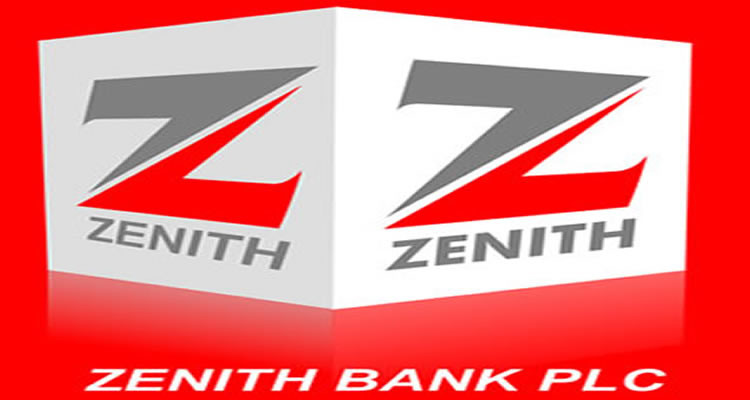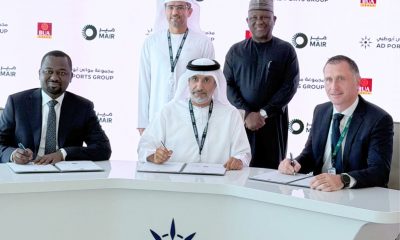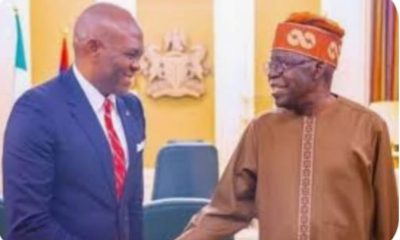Business
ZENITH BANK TRANSITIONS THROUGH PANDEMIC YEAR WITH 10% GROWTH IN PAT

In a rare display of resilience and doggedness, Zenith Bank Plc has announced an impressive result for the year ended December 31, 2020, with a year-on-year growth of 10% in profit after tax (PAT) from N208.8 billion recorded in 2019 to N230.7 billion. This is in spite of a challenging macroeconomic environment exacerbated by the COVID 19 pandemic.
According to the bank’s audited financial results for the 2020 financial year presented to the Nigerian Stock Exchange (NSE) on Tuesday, February 23 2021, the Group recorded a growth in gross earnings of 5% from N662.3 billion in the previous year to N696.5 billion. The Group also recorded 8% growth in non-interest income from NGN232.1 billion in 2019 to NGN251.7 billion in 2020 and a 1% increase in interest income from NGN415.6 billion in 2019 to NGN420.8 billion in 2020.
Profit before tax (PBT) also increased by 5%, growing from N243.3 billion in 2019 to N255.9 billion in the current year. The increase arose from a combination of growth in the topline and a significant reduction in interest expense. Interest expense reduced from N148.5 billion in 2019 to N121.1 billion in 2020, significantly increasing the net interest income from NGN267.0 billion in 2019 to NGN299.7 billion in 2020.
The Group’s increased retail activities translated to a corresponding increase in retail deposits and loans. Thus, retail deposits grew by NGN612.7 billion from NGN1.11 trillion to NGN1.72 trillion year-on-year (YoY), while savings balances significantly grew by 88% YoY and closed at NGN1.16 trillion. This retail drive, coupled with the low-interest yield environment, helped reduce the cost of funding from 3.0% to 2.1% and also reduced interest expense. However, the low-interest environment also affected the net interest margin, which declined from 8.2% to 7.9% in the current year due to the re-pricing of interest-bearing assets. Operating costs grew by 10% YoY but are still tracking well below inflation which at the end of the year stood at 15.75%. Although returns on equity and assets also reduced from 23.8% to 22.4% and from 3.4% to 3.1%, respectively, the Group still delivered improved Earnings per Share (EPS), which grew 10% from NGN6.65 to NGN7.34 in the current year.
The Group also increased corporate customer deposits, which alongside the growth in retail deposits, delivered total deposit growth of 25%, to close at N5.34 trillion, driving growth in market share. Total assets also increased significantly by 34%, from N6.35 trillion to N8.48 trillion. Despite the COVID-19 pandemic and its associated challenges, the Group created new viable risk assets as gross loans grew by 19%, from N2.46 trillion to N2.92 trillion. This was achieved while maintaining a stable and low overall NPL ratio of 4.29% (2019: 4.3%) across the entire portfolio and an increase in the cost of risk from 1.1% to 1.5%, reflecting the elevated risk environment in 2020. The Group recorded impressive liquidity and capital adequacy ratios of 66.2% and 23.0% and remained above regulatory thresholds of 30% and 15%, respectively.
In a demonstration of its commitment to its shareholders, the bank has announced a proposed final dividend payout of N2.70 per share, bringing the total dividend to N3.00 per share.
As a testament to this superlative performance and in recognition of its track record of excellent performance, Zenith Bank was voted as Bank of the Year (Nigeria) in The Banker’s Bank of the Year Awards 2020, Best Bank in Nigeria in the Global Finance World’s Best Banks Awards 2020 and Best Corporate Governance ‘Financial Services’ Africa 2020 by the Ethical Boardroom. Also, the bank emerged as the Most Valuable Banking Brand in Nigeria, for the fourth consecutive year, in the Banker Magazine “Top 500 Banking Brands 2021” and Number One Bank in Nigeria by Tier-1 Capital in the “2020 Top 1000 World Banks” Ranking published by The Banker Magazine. Similarly, the bank was recognised as Bank of the Decade (People’s Choice) at the ThisDay Awards 2020, Retail Bank of the year at the 2020 BusinessDay Banks and Other Financial Institutions (BOFI) Awards, and Best Company in Promotion of Good Health and Well-Being as well as Best Company in Promotion of Gender Equality and Women Empowerment at the Sustainability, Enterprise and Responsibility (SERAS) Awards 2020.
Business
Nigeria’s Inflation Drops to 15.10% as NBS Reports Deflationary Trend

Nigeria’s headline inflation rate declined to 15.10 per cent in January 2026, marking a significant drop from 27.61 per cent recorded in January 2025, according to the latest Consumer Price Index (CPI) report released by the National Bureau of Statistics.
The report also showed that month-on-month inflation recorded a deflationary trend of –2.88 per cent, representing a 3.42 percentage-point decrease compared to December 2025. Analysts say the development signals easing price pressures across key sectors of the economy.
Food inflation stood at 8.89 per cent year-on-year, down from 29.63 per cent in January 2025. On a month-on-month basis, food prices declined by 6.02 per cent, reflecting lower costs in several staple commodities.
The data suggests a sustained downward trajectory in inflation over the past 12 months, pointing to improving macroeconomic stability.
The administration of President Bola Ahmed Tinubu has consistently attributed recent economic adjustments to ongoing fiscal and monetary reforms aimed at stabilising prices, boosting agricultural output, and strengthening domestic supply chains.
Economic analysts note that while the latest figures indicate progress, sustaining the downward trend will depend on continued policy discipline, exchange rate stability, and improvements in food production and distribution.
The January report provides one of the clearest indications yet that inflationary pressures, which surged in early 2025, may be moderating.
Bank
Alpha Morgan to Host 19th Economic Review Webinar

Alpha Morgan to Host 19th Economic Review Webinar
In an economy shaped by constant shifts, the edge often belongs to those with the right information.
On Wednesday, February 25, 2026, Alpha Morgan Bank will host the 19th edition of its Economic Review Webinar, a high-level thought leadership session designed to equip businesses, investors, and individuals with timely financial and economic insight.
The session, which will hold live on Zoom at 10:00am WAT and will feature economist Bismarck Rewane, who will examine the key signals influencing Nigeria’s economic direction in 2026, including policy trends, market movements, and global developments shaping the local landscape.
With a consistent track record of delivering clarity in uncertain times, the Alpha Morgan Economic Review continues to provide practical context for decision-making in a dynamic environment.
Registration for the 19th Alpha Morgan Economic Review is free and can be completed via https://bit.ly/registeramerseries19
It is a bi-monthly platform that is open to the public and is held virtually.
Visit www.alphamorganbank to know more.
Business
GTBank Launches Quick Airtime Loan at 2.95%

GTBank Launches Quick Airtime Loan at 2.95%
Guaranty Trust Bank Ltd (GTBank), the flagship banking franchise of GTCO Plc, Africa’s leading financial services group, today announced the launch of Quick Airtime Loan, an innovative digital solution that gives customers instant access to airtime when they run out of call credit and have limited funds in their bank accounts, ensuring customers can stay connected when it matters most.
In today’s always-on world, running out of airtime is more than a minor inconvenience. It can mean missed opportunities, disrupted plans, and lost connections, often at the very moment when funds are tight, and options are limited. Quick Airtime Loan was created to solve this problem, offering customers instant access to airtime on credit, directly from their bank. With Quick Airtime Loan, eligible GTBank customers can access from ₦100 and up to ₦10,000 by dialing *737*90#. Available across all major mobile networks in Nigeria, the service will soon expand to include data loans, further strengthening its proposition as a reliable on-demand platform.
For years, the airtime credit market has been dominated by Telcos, where charges for this service are at 15%. GTBank is now changing the narrative by offering a customer-centric, bank-led digital alternative priced at 2.95%. Built on transparency, convenience and affordability, Quick Airtime Loan has the potential to broaden access to airtime, deliver meaningful cost savings for millions of Nigerians, and redefine how financial services show up in everyday life, not just in banking moments.
Commenting on the product launch, Miriam Olusanya, Managing Director of Guaranty Trust Bank Ltd, said: “Quick Airtime Loan reflects GTBank’s continued focus on delivering digital solutions that are relevant, accessible, and built around real customer needs. The solution underscores the power of a connected financial ecosystem, combining GTBank’s digital reach and lending expertise with the capabilities of HabariPay to deliver a smooth, end-to-end experience. By leveraging unique strengths across the Group, we are able to accelerate innovation, strengthen execution, and deliver a more integrated customer experience across all our service channels.”
Importantly, Quick Airtime Loan highlights GTCO’s evolution as a fully diversified financial services group. Leveraging HabariPay’s Squad, the solution reinforces the Group’s ecosystem proposition by bringing together banking, payment technology, and digital channels to deliver intuitive, one-stop experiences for customers.
With this new product launch, Guaranty Trust Bank is extending its legacy of pioneering digital-first solutions that have redefined customer access to financial services across the industry, building on the proven strength of its widely adopted QuickCredit offering and the convenience of the Bank’s iconic *737# USSD Banking platform.
About Guaranty Trust Bank
Guaranty Trust Bank (GTBank) is the flagship banking franchise of GTCO Plc, a leading financial services group with a strong presence across Africa and the United Kingdom. The Bank is widely recognized for its leadership in digital banking, customer experience, and innovative financial solutions that deliver value to individuals, businesses, and communities.
About HabariPay
HabariPay is the payments fintech subsidiary of GTCO Plc, focused on enabling fast, secure, and accessible digital payments for individuals and businesses. By integrating payments and digital technology, HabariPay supports innovative services that make everyday financial interactions simpler and more seamless.
Enquiries:
GTCO
Group Corporate Communication
[email protected]
+234-1-2715227
www.gtcoplc.com
-

 celebrity radar - gossips6 months ago
celebrity radar - gossips6 months agoWhy Babangida’s Hilltop Home Became Nigeria’s Political “Mecca”
-

 society6 months ago
society6 months agoPower is a Loan, Not a Possession: The Sacred Duty of Planting People
-

 society5 months ago
society5 months agoReligion: Africa’s Oldest Weapon of Enslavement and the Forgotten Truth
-

 news6 months ago
news6 months agoTHE APPOINTMENT OF WASIU AYINDE BY THE FEDERAL GOVERNMENT AS AN AMBASSADOR SOUNDS EMBARRASSING









